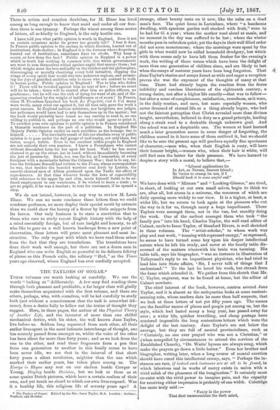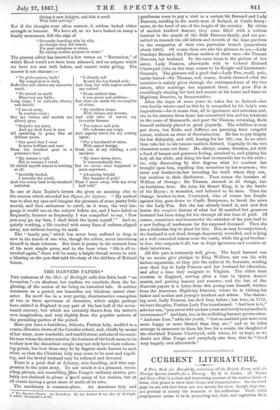THE TAYLORS OF ONGAR.*
TIIESE volumes are worth looking at carefully. We use the words " looking at " deliberately. A few may find reading them through both pleasant and profitable, a far larger class will gladly make themselves acquainted with the first volume, and there are others, perhaps, who, with ourselves, will be led carefully to study both (not without a consciousness that the task is somewhat irk- some), from a desire fully to follow out the trains of thought they suggest. Here, in these pages, the author of the Physical Theory of Another Life, and the inventor of more than one skilful mechanical device, with his sister, the well known Jane Taylor, live before us. Seldom long separated from each other, all their earlier lives spent in the most intimate interchange of thought, one has scarcely passed from amongst us, whilst the voice of the other has been silent for more than forty years ; and as we look from the one to the other, and read these fragments from a pen that from one generation to another in this family seems to have been never idle, we see that in the interval of that short forty years a silent revolution, mightier than the one which marked their earlier years, has taken place among us. The Essays in Rhyme may rest on our shelves beside Cowper or Young, Display beside Decision, but we look at them as at some quaint Dutch pictures, which have a certain realism of their own, and yet touch no chord to which our own lives respond. Was it a healthy life, this religious life of seventy years ago? A • The Taylors of Onpar. Edited by the Rel. Isaac Ta3lor, E.A. London : Jackson, Watford, and Hodder. strange, silent beauty rests on it now, like the calm on a dead man's face. The quiet home in Lavenham, where " a handsome dwelling, with spacious garden well stocked with fruit," were to be had for 61. a year ; where the mother read aloud at meals, and no moment in the day was suffered to be lost ; where the winter months pass in unbroken quiet; yet the days in their well filled order- did not seem monotonous ; where the mornings were spent by the girls in what would now be called household drudgery, but which with them seems only to have left them fresher for the evening's work, the writing of those verses which have been the delight of more than one generation of children since, and are likely to last- when the essays of maturer years have been long forgotten. That JaneTaylor's stories and essays found so wide and eager a reception proves she was the exponent of the thoughts of many at that time. There had already begun the reaction from the fierce infidelity and careless libertinism of the eighteenth century, a strong desire, not after a higher life exactly—that was to follow— but after a sense of completeness, satisfaction, roundness, as it were, in the daily routine, and men, but more especially women, who never dreamed of eternal life, as a thing already begun, who had not the faintest perception that Christ revealed more than divines taught, nevertheless, believed in duty as a grand principle, leading along a strait road to a desirable though unknown goal. And the school was not a despicable one. The women at least learned much a later generation seems in some danger of forgetting, the children nursed in it have some of them outlived it, but we should like to be sure the present age will produce equally fine specimens of character,—men who, when their English is rusty, will have their honour bright,—women who, when their hair is white, will still find men the better for their presence. We have learned to despise a story with a moral, to believe that,— " Liberal applications lie In Art, as Nature, dearest friend ; So 'twere to cramp its use, if I Should hook it to some useful end."
We have done with " Mirrors " and " Looking-Glasses," are tired, in short, of looking at our own small selves, begin to think we are, after all, but atoms in a universe, the resources of which are daily opening more widely to our view. It is a higher, at least, a wider life, but we return to look again at the pioneers who cut the way to it for us, through many a huge impediment. These Taylors were amongst them, not in the van, but steadily doing the work. One of the earliest amongst them who took " the family pen" into his hand, Charles Taylor, the well read editor of Calmet, uncle to Isaac Taylor, of Stanford Rivers, is well sketched in these volumes. The " artist-scholar," to whom work was play and rest work, " teeming with repressed energy," so repressed, he seems to have turned some key upon his deeper intellectual nature when he left his study, and never at the family table dis- coursed of the matters wherewith his brain was teeming. His table talk, says his biographer, " was an instance in illustration of Talleyrand's reply to an impertinent physician, who bad tried to lead him into State affairs, ' Sir, I never talk of things that I understand.' " To the last he loved his work, but shrank from the fame which attended it. We gather from this sketch that Mr. C. Taylor, engraver, was to be found at home, but the editor of Calmet nowhere.
The chief interest of the book, however, centres around Jane Taylor, and it is almost as the antiquarian looks at some ancient- seeming coin, whose modern date he more than half suspects, that we look at these letters of not yet fifty years ago. The names are the familiar names of places and people yet among us, but the style, which had lasted many a long year, has passed away for ever ; a wider life, quicker travelling, and cheap postage have rendered impossible the long sententious letters which were the delight of the last century. Jane Taylor's are not below the average, but they are full of mental provincialisms, such as " Certainly, no one ever prayed who was not a Christian," or (when compelled by circumstances to attend the services of the Established Church), "Dr. Watts' hymns are always sung, which make the prayers go down a little better." Even her brother and biographer, writing later, when a long course of mental exertion should have cured this intellectual cramp, says, " Perhaps the in- stances are rare, if indeed such instances are at all to be found, in which laborious zeal in works of mercy exists in union with a vivid relish of the pleasures of the imagination." It certainly must co-exist with the vivid power to imagine pain, and the capacity for receiving either impression is probably of one width. Coleridge has more truly said :— "Fancy is the power That first unsensualizes the dark mind,
Giving it new delights, and bids it swell With wild activity."
Yet if the thought were often narrow, it seldom lacked either strength or humour. We have all, as we have looked on many a family monument, felt the edge of
"Devoutly kneeling side by side,
As though they did intend, For past omissions to atone, By saying endless prayers in stone."
The present editor has inserted a few verses on " Recreation," of which Hood would not have been ashamed, and an enigma which we have not met with before, and cannot resist giving. The answer is not obscure :—
In one of Jane Taylor's letters she gives an amusing clue to the success which attended her Hymns for Infants. " My method was to shut my eyes and imagine the presence of some pretty little mortal, and then endeavour to catch, as it were, the very lan- guage it would use on the subject before me, and I have failed so frequently, because so frequently I was compelled to say, ' Nov you may go, my dear, I shall finish the hymn myself." And so, quietly working, a life touched with many lines of sadness slipped away, not without leaving its mark.
The " family pen," which has never been suffered to drop, is now in the hands of one who, though the editor, never introduces himself in these volumes. But there is poetry in the sternest lines of his most simple prose, and in the hour when "life is all re- touched again," there will be many a bright thread woven in with a blessing on the pen-that told the story of the children of Bethnal Green.
"Ye philosophers, hark My complexion is dark, Reflection and silence my character mark.
"No record on earth Discovers my birth;
Long reign I in solitude, silence, and dearth.
"I travel away, In sombre array ; But my turban and sandals are silvery grey.
"Majestic my mien, And my dark form is seen All sparkling in gems, like an African queen.
" One pearl that I wear Is more brilliant and rare Than the loveliest gem in a princess's hair.
"My stature is tall, But at seasons I crawl, Or shrink myself almost to nothing at all.
"Invisibly hurled, I traverse the world, And o'er every land is my standard unfurled. "I silently roll Round the icy-bound pole ; And long the wide region endures my control.
"From earliest time I was grave and sublime ; But often am made the accomplice of crime.
"My intellect teems With visions and dreams, And wild tales of terror, my favourite themes.
"Yet sorrow and pain Oft welcome my reign, And eagerly watch for my coming again: "For a handmaid of mine, With aspect benign, Deals out, at my bidding, a soft anodyne.
"My sister down there, Is transcendently fair, But we never once happened to meet anywhere.
" Advancing behold Her banners of gold !
Then I must away, with my story half told."































 Previous page
Previous page